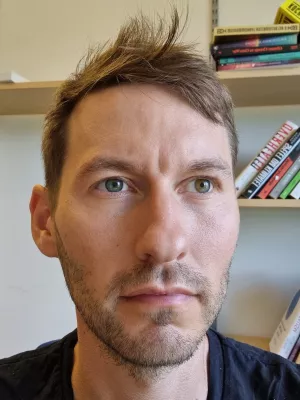
Kristoffer Ekberg
Associate senior lecturer

Mellan flykt och förändring : Utopiskt platsskapande i 1970-talets alternativa miljö
Between estrangement and change : Utopian place-making in Swedish alternative milieus in the 1970s
Author
Summary, in English
Drawing on the field of utopian studies and the conflict inherent in the concept of utopia between the ‘no place’ and the ‘good place’, combined with relational perspectives on social movements and places, I analyse specific places and general place-making processes and their connection with the wider world. Using interviews from the late 1970s and a broad variety of written sources, both internal records such as bulletins and correspondence and published material such as newspapers, the four empirical chapters address, in order, prefigurative politics; the question of estrangement; relationships between the individual and the societal sphere; and the broader networks envisioned and enacted in Sweden’s alternative milieus.
My findings show that the form of transformation produced at alternative sites largely concerned the question of setting a good example—a tactic that demanded visibility and hands-on engagement in their local community. Yet this was matched by an apparent lack of interest in national politics that stemmed from their idea of a translocalized struggle designed to create more such communities. I argue that the conceptualization of alternative places as estranged entities is only partly valid. In light of my results a more apt description would be that they were engaged in a political strategy that broke with a tradition of addressing their demands to the state, and instead pursued a human-rights inspired tactic of enabling other ‘ways of life’. The conclusion is that the alternative milieus bridged the social movement practices seen in Sweden in the late sixties and in the early eighties.
Department/s
- Department of Human Geography
- History
- National Graduate School of History
Publishing year
2016-11-18
Language
Swedish
Full text
Document type
Dissertation
Topic
- Humanities
Keywords
- intentional communities
- Utopian studies
- Prefiguration
- social movements
- place
- environmental movements
- counterculture
Status
Published
Supervisor
- Kim Salomon
- Monika Edgren
ISBN/ISSN/Other
- ISBN: 978-91-88473-17-2
- ISBN: 978-91-88473-18-9
Defence date
16 December 2016
Defence time
10:15
Defence place
LUX aula övre (C116b), LUX, Helgonavägen 3, Lund
Opponent
- Helena Hill (fil dr)

